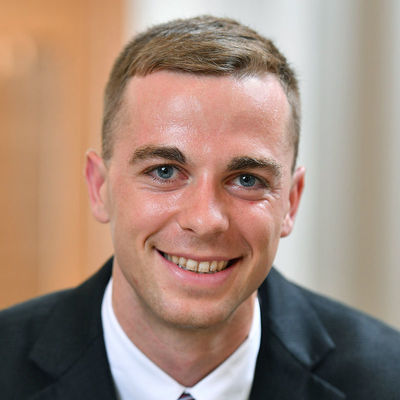Brian Hickey

Brian Hickey is a master of global affairs student at the Keough School. He most recently worked with migrants and refugee children in a school and center for street children in Djibouti. He also taught English literature and leadership at a Palestinian high school in the West Bank, served as a volunteer at the Indiana State Prison for several years, and spent the summer of 2015 in South Africa and Zambia working with a local nongovernmental organization. Brian holds a BS in business management and a minor in political science from Valparaiso University, where he was a student-athlete. He is the recipient of a Donald & Marilyn Keough Fellowship.
“I think some of the most challenging obstacles will be related to how the world - and our own country - will perceive the importance of American leadership in the promotion of civil and human rights."
How did you first become interested in human rights?
As an undergraduate I worked in prison ministry at the Westville Correctional Facility and the Indiana State Prison. I often wondered how many people inside the prison should actually still be there, given their level of rehabilitation. The weekly interactions I had there often made me feel as if I was the one leaving more encouraged than the inmates.
My interest then expanded internationally to the West Bank, Palestine, teaching at a high school where my students were deprived of opportunities simply because of where they were born. Some of the most memorable moments were when the basketball team I coached traveled across the Israeli/Palestinian border to play a tournament. It was always difficult getting our students the permission to cross, and the last obstacle was having our bus searched. I recall the level of excitement once we were cleared to cross, and my students could go into Israel - one of the rare times they were allowed across the wall.
I also became passionate about the rights of refugees, especially unaccompanied refugees, after working with migrants and refugee boys from Ethiopia, Somalia, and Yemen in Djibouti.
From whom have you drawn inspiration?
My ultimate inspiration comes from my Christian faith and relationship with Christ. I also draw inspiration from the relentless work of two Notre Dame men, Fr. Hesburgh and Fr. David Link. Fr. Link is a former dean of ND Law School who became a priest upon retirement and has dedicated the rest of his life to advocating for men at Indiana State Prison and changes in the criminal justice system. I have served with Fr. Link at Indiana State Prison for several years.
Finally, my mentor in South Africa and Zambia, Casper Steenkamp, has been an inspiration to me in how he lives his life for the fatherless and impoverished in South Africa. Casper helped me discover my passions and led me on the path I am on now.
What is the specific emphasis of your work? What issues do you feel most determined to address?
The emphasis of my study at Notre Dame is U.S. foreign policy and diplomacy. I feel most determined to work on U.S. foreign policy, especially in the Middle East and North Africa. I am also interested in the Christian community in this region of the world and how we can better protect them as a religious minority amid all the growing obstacles and threats that persist. I believe the time is ripe for looking at the impact religious minorities play in the region and how they must be protected with all the turmoil currently playing out.
What obstacles do you perceive as the most challenging in your work?
I think some of the most challenging obstacles will be related to how the world - and our own country - will perceive the importance of American leadership in the promotion of civil and human rights. From my studies and interactions with policymakers this year, it seems that many are concerned that a lack of American leadership in the world will lead to regimes feeling empowered to commit human rights violations against the vulnerable. This is a question I am continuing to study.
What path forward do you see as most promising?
I think we need to understand the role the U.S. can play in promoting civil and human rights, and appreciate how this benefits our nation along with the rest of the world. I believe the case of Jamal Ahmad Khashoggi could provide some insights. When the U.S. holds leaders accountable, others seem to be more cautious regarding human rights abuses. I think this creates a more just and peaceful society.